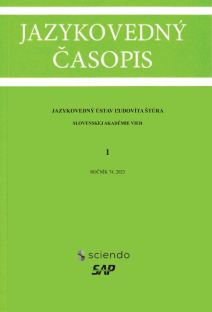The Economy of Czech Exchange in the Slovak Marketplace of Austria after the Fall of Hungary
The Economy of Czech Exchange in the Slovak Marketplace of Austria after the Fall of Hungary
Author(s): Martin Diweg-PukanecSubject(s): Language and Literature Studies, Theoretical Linguistics, Applied Linguistics, Lexis, Sociolinguistics
Published by: SAV - Slovenská akadémia vied - Jazykovedný ústav Ľudovíta Štúra Slovenskej akadémie vied
Keywords: applied linguistics; economy principle; language management; linguistic marketplace; social class; sociolinguistics; word length
Summary/Abstract: Lexical quanta in writing and speech are important indicators of an individual’s social class. This paper analyses the lexical features of the utterances produced by writers/speakers from different social classes in terms of word length based on a representative sample of letters from the Kremnica archive. The study found that writers/speakers from different social classes showed different average word length in the 2nd half of the 16th century. According to the analysis of the letters, writers/speakers from the upper classes produced utterances with longer words than those from the lower classes. These differences are explained by factors related to the individual’s social class backgrounds and his "right to speech" or "right to be read". The linguistic economy principle, objective of which is to save more time and energy by conveying more information with less effort is thus far from exhaustive and by no means reflects the whole sociolinguistic reality.
Journal: Jazykovedný časopis
- Issue Year: 74/2023
- Issue No: 1
- Page Range: 43-51
- Page Count: 9
- Language: English

